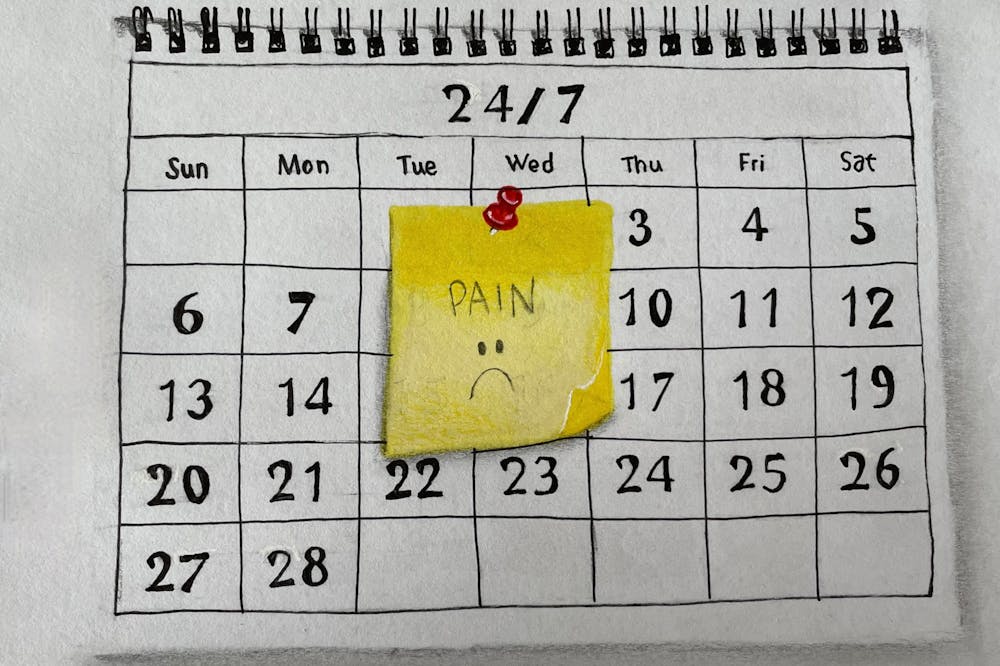Before I got my period, I had heard, obviously, about the future my body had planned for me. I had heard that it was painful, and bloody, but those warnings hadn't fully prepared me for the reality of what was to come.
When we talk about menstrual cramps, we do so with the underlying assumption that they are simply unpleasant — we rarely take the time to acknowledge just how disenfranchising they are.
For me, cramps are not cramps, but a week of full-body soreness that hits my joints the hardest, followed by a hellish day of hot iron pressing out from inside me. Ibuprofen, Tylenol, Midol in ridiculously high dosages — nothing changes the fact that one of my organs is tearing itself to shreds inside me, and I can feel every second of it.
I've been to a few doctors now. They don't have answers for me. I'm just one of the 25.3% of menstruating people left alone and in pain by the lack of knowledge that the medical community has on uterine conditions.
Care for people like me is slowly gaining visibility. With the additional voices of people like Bindi Irwin – who, after 10 years of dismissal and misdiagnosis, finally underwent surgery for endometriosis – it's just a little easier for us to exist in the world.
That isn't consistent in college. Especially not at ASU.
That fact is something that came as a major disappointment to me. I love college. I started as an English literature major, but I loved college enough that I added a second major and began studying journalism at the Walter Cronkite School of Journalism and Mass Communication in my sophomore year amid the COVID-19 pandemic. I also added a certificate in LGBTQ+ studies.
I maintained good grades in all these programs, but despite that, my pain required that I make full use of every pandemic-era allotted absence. It didn't matter if I loved my classes, there were days that attending lectures or labs wasn't possible because I physically could not get out of bed.
COVID-19 policies made this a little easier. Maybe I couldn't get out of bed, but with enough pain medications, a heating pad and the safety of my own room, I could usually attend class via Zoom and still absorb most of the lesson.
For the last year, however, despite the continued risk of contracting COVID-19, Cronkite has phased out most of its pandemic policies, returning to the punitive absence policy that requires every student to "attend all classes for their full duration."
Last semester, one of my classes took this to its extreme. My professor's syllabus stated that if you did not attend class, you could not get credit for the homework attached to the lecture from that day, even if it was due a week later — a ridiculous policy that eliminated any academic motivation to actually learn or practice that week's content.
I knew before the semester started that I wouldn't be able to make every day of class. Since homework and in-class coursework made up a considerable portion of my grade, I attempted to discuss this with the professor, who redirected me to Student Accessibility and Inclusive Learning Services.
SAILS did provide me with accommodations, but the process alone was intimidating. I couldn't tell them what was wrong with me; I had no diagnosis to refer them to.
On average, it takes 10 years to get diagnosed with endometriosis, the most common condition associated with this kind of pain, so I couldn't just go get a diagnosis either.
Instead of being able to provide them with a doctor’s recommendations, I had to beg them to listen to me and hope that they believed my needs were severe enough to warrant assistance. The fear that they would decide I wasn't an exception to the universally agreed upon experience of "cramps" loomed over the entire interaction.
Given that many courses at Cronkite inflict academic repercussions for lack of attendance, my grades relied on the empathy of SAILS staff, and I am very lucky that they were willing to listen to me.
Even so, I am trapped in a double bind. According to my doctors, I am normal, my body is functioning the way it should, and nothing is wrong. According to Cronkite, I am a student with disabilities, and I need accommodations to succeed.
Yet the only reason I need accommodations at all is because of Cronkite’s attendance policies. This issue is nonexistent in my English courses where I and my classmates are given more absences and leniency. It is nonexistent in the jobs I have held, where open communication allows me to work from home as needed or simply take a day off.
So, if the policy isn't for my professors — given that my English professors have no issues with increased absences — and it doesn't emulate a real-world work environment — as my professional experiences have demonstrated — what exactly is it for?
This doesn't even mention how such a draconian attendance policy makes anonymity as a SAILS student impossible. If you have a classmate who's absent from more than one class, they are either a SAILS student or they are failing — perpetuating the idea that disabled individuals are less capable of managing a "normal" workload.
Disabled students are capable. Students with unknown conditions like mine are capable. They just can’t surmount the obstacle that Cronkite has set with its attendance policy.
Edited by Alexis Waiss, Sadie Buggle and Caera Learmonth.
Reach the reporter at cvandore@asu.edu and follow @cvandoren27 on X.
Like The State Press on Facebook and follow @statepress on X.

Claire van Doren is the Echo desk editor, using her English Literature and Journalism majors to bring insightful, thought-provoking pieces to The State Press. She has a deep love of storytelling that extends to articles, television, podcasts, and novels.




